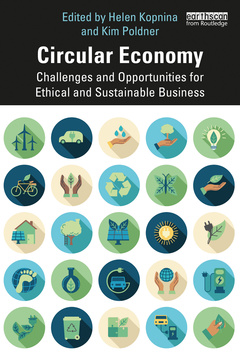Description
Circular Economy
Challenges and Opportunities for Ethical and Sustainable Business
Coordinators: Kopnina Helen, Poldner Kim
Language: English
Subjects for Circular Economy:
Keywords
Circular Economy; Sustainable Business; Sustainability; Value Creation; Biomimicry; Circular Technologies; Circular Supply Chains; Potential Partner Firms; Closing Loops; Common Language; Biospheric Altruism; Circular Business; Business Cases; Product Service Systems; Nep Scale; Circular Bm; Literature Review; Emf; Conceptual Mapping Exercises; Inter-firm Collaboration; Pro-environmental Behaviour; Innovation Funnel; Revise Nep Scale; Lean Startup; Sustainable Entrepreneurs; Engineering PhD Student; Sustainable Entrepreneurship; Proposition Elements; Partner Firms; Entrepreneurial Identity
Publication date: 08-2021
· 15.6x23.4 cm · Paperback
Publication date: 08-2021
· 15.6x23.4 cm · Hardback
Description
/li>Contents
/li>Readership
/li>Biography
/li>
How can we design circular business models? How can we organize the transition from a linear to a circular economy? And how can we imagine circular futures that help us transform current realities? This book aims to provide answers to these questions while addressing the challenges and opportunities of the circular economy.
The authors reflect on why conventional sustainability models ? such as the ?triple P? (People, Profit and Planet) or eco-efficiency ? have failed in addressing environmental challenges, including climate change, biodiversity loss and pollution. They then move on to explore innovative circular business models, which propose to eliminate environmental damage by radically reforming the system of industrial production. Organizing the transition is a collaborative effort: entrepreneurs, consumers, policymakers, multinationals and intermediaries need to work together to foster the emergence of the circular economy as an institutional field. Together with younger generations of learners and equipped with beyond-human-centred values towards awareness of the material and natural world, novel circular futures can be imagined.
Offering points of reference for continued critical discourse and examples of practically applicable sustainability solutions, this book will be of great interest to students, teachers, practitioners and scholars of circular economy.
Part I: Designing circular business models 1. Changing the Logic of Value Creation 2. Doing More with Less 3. Circular Business Models Part II: Organizing circular transitions 4. Sustainability Frameworks 5. Understanding the Role of Institutional Intermediaries in the Emergence of the Circular Economy as an Institutional Field 6. The Rise of the Circular Entrepreneur Part III: Imagining circular futures 7. Learning Towards a Circular Ecosystem 8. Biomimicry Education as a Vehicle for Circular Design 9. Organizing the Emergence of Circular Technologies
Helen Kopnina is currently employed at The Hague University of Applied Sciences (HHS) in the Netherlands, where she coordinates the Sustainable Business Programme.
Kim Poldner is Professor of Circular Business at The Hague University of Applied Sciences, the Netherlands.
These books may interest you

Circular Economy For Dummies 24.87 €



